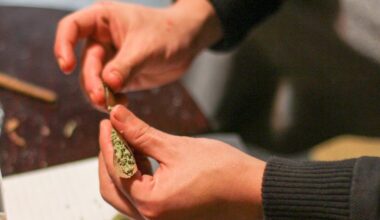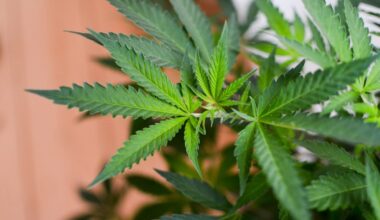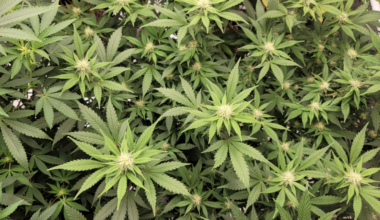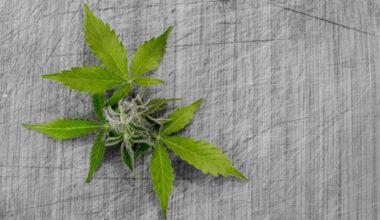U.S. military officials are currently reviewing Air Force and Space Force marijuana policies and considering a “common sense” change that could give potential recruits a pass if they test positive for cannabis.
Military branches have generally maintained a zero-tolerance marijuana policy for service members, with some going so far as to ban the use of federally legal CBD products. But with more states moving to legalize cannabis, the Air Force is revisiting its recruitment guidelines.
Maj. Gen. Ed Thomas, the commander of the Air Force Recruiting Service, told Air Force Times in an interview published on Wednesday that the current marijuana policy “permanently” disqualifies people from service if they test positive for THC metabolites during a mandatory drug screening. But as the legalization movement continues to expand, “there is an increased prevalence of THC-positive applicants.”
For those THC-positive applicants who are otherwise in good standing and can commit to abstaining while in the service, Thomas suggested that a waiver may be warranted.
“We have to be realistic today,” he said. “We need to exercise common sense.”
That’s a notable pivot for the branch, as the Air Force instituted a policy in 2019 barring service members from using non-intoxicating CBD, even if its derived from hemp and is therefore federally legal under the 2018 Farm Bill.
A Massachusetts base of the Air Force released a notice last year stating that service members can’t even bring hemp-infused products like shampoos, lotions and lip balms to the base. “Even if it’s for your pet, it’s still illegal,” the notice said.
Officials with the military branch also said in 2018 that it wants its members to be extra careful around “grandma’s miracle sticky buns” that might contain marijuana.
Of course, military members who use marijuana while in active or reserve service will still face disciplinary action, but the Air Force now seems willing to make some recruitment policy adjustments such as waivers for those who test positive for cannabis. The policy is still under review, however, and it’s not clear when or even if changes may be instituted.
Over the past several years, particularly since hemp was legalized, multiple military branches have notified their rank-and-file about their specific rules around cannabis.
In 2019, the Department of Defense (DOD) made clear that marijuana remains off-limits regardless of state law, and it also announced a policy prohibiting all active and reserve service members from using hemp products, including CBD. The department reaffirmed that CBD rule in subsequent notices published in 2020.
The Navy, for its part, issued an initial notice in 2018 informing ranks that they’re barred from using CBD and hemp products no matter their legality. Then in 2020 it released an update explaining why it enacted the rule change.
The Naval War College has gone so far as to warn Sailors and Marines about new hemp products on the market, issuing a notice earlier in April that says members can drink a new Pepsi-owned Rockstar energy drink that contains hemp seed oil.
However, that military branch does permit waivers for recruits who test positive for THC if there are no other outstanding issues with the candidate. The Marine Corps also permits temporary waivers for THC-positive applicants.
The Coast Guard said that sailors can’t use marijuana or visit state-legal dispensaries.
A factor that may have influenced these policy updates is that the Substance Abuse and Mental Health Services Administration released guidance to federal agency drug program coordinators in 2019 that outlined concerns about THC turning up in CBD products and causing failed drug tests. The agency issued an updated warning in 2020 after several more states voted to legalize marijuana.
A government-funded report from the RAND Corporation that was released last year looked into U.S. Army recruits and concluded that past cannabis use has relatively little impact on overall performance.
An Army spokesperson told Military Times that the army provides THC-positive recruits with a 90-day waiver before they can try to join the service again. A second positive test would render the recruit permanently disqualified.
As part of the House-passed National Defense Authorization Act (NDAA), a provision from Rep. Anthony Brown (D-MD) calls for a review of cannabis sentencing standards under military code, and would mandate that the Military Justice Review Panel “develop recommendations specifying appropriate sentencing ranges for offenses involving the use and possession of marijuana.”
Meanwhile, the U.S. Department of Veterans Affairs (VA) has separately faced criticism over its stance on cannabis issues.
In March, for example, VA made clear that it won’t provide support for treatment involving marijuana as part of a new grants program aimed at preventing veteran suicide.
VA’s position on marijuana has been a source of consistent frustration for advocates and veteran service organizations who have been pushing for expanded research into the therapeutic potential of cannabis.
House and Senate committees held joint hearings in March to hear from veterans service organizations (VSOs) about how Congress and the federal government can better serve their constituents, and several of the groups brought up the need to ease restrictions on marijuana.
The testimony echoes what the VSOs have repeatedly raised with lawmakers. The specifics ranged in scope between the various groups, but the overall message was made clear: military veterans uniquely stand to benefit from marijuana treatment and it’s time for Congress to do something about it.
Pharmaceutical Industry Suffers Billions In Losses After States Legalize Marijuana, New Study Finds
Photo courtesy of Defense Visual Information Distribution Service.
Medical Disclaimer:
The information provided in these blog posts is intended for general informational and educational purposes only. It is not a substitute for professional medical advice, diagnosis, or treatment. Always seek the advice of your physician or other qualified healthcare provider with any questions you may have regarding a medical condition. The use of any information provided in these blog posts is solely at your own risk. The authors and the website do not recommend or endorse any specific products, treatments, or procedures mentioned. Reliance on any information in these blog posts is solely at your own discretion.






